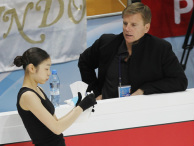 Behind every amazing Olympian we see in Sochi is a huge support system without which the athlete may not be in Sochi at all. This includes family, friends, trainers, and, oh yes, the coaches. So often we wonder about the mental challenges the athletes face in competition there at the "really big show." But have you considered the challenges faced by the coaches? Don't worry, I hadn't much either until recently. I was reading an article by Sean McCann, a sport psychologist who worked with Team USA at the Games years ago. He discussed the many aspects of working with Olympians on-site. But one individual made a special request of his time--the coach for one of the US Teams. He was having a hard time, feeling anxious, more out-of-sorts than usual. Turns out a number of factors play into this state for him, and many other coaches who find themselves in the midst of a larger-than-life competition. You would think foremost in the coach's mind is, "Will my athlete be successful?" Well, it is, but that isn't necessarily what causes the stress. The biggest issue for coaches at the Olympic Games is a sudden and pervasive lack of control, or a feeling to that effect: lack of control over training time and conditions, athlete schedules, meals, sleep. The media requests for their athlete's time interfere as well. And then there is the social aspect of the Games. The athletes may want to "fully experience" the camaraderie, attending gatherings, staying out late, easing up on their normal discipline. These things in and of themselves are not necessarily detrimental to the athlete's ultimate performance at the Games. It is just the idea that these things are different than normal, not part of a well-rehearsed routine, that can be so anxiety-producing for the coach. All of these factors, being beyond the control of the coach, certainly make their main focus of their athlete's success seem more uncertain. My figure skating coach had the distinct opportunity to attend the 2006 Olympic Games. He was coaching a young pairs team for Team Bulgaria. I recently asked him about the stress he may have felt. "TV cameras were everywhere!" he exclaimed. He agreed that it was suddenly difficult to control what he was used to controlling with his skaters. I would imagine, too, with cameras rolling all the time, it would be intimidating to offer corrections, suggestions, etc., with a thought in the back of your mind, Anything you say may be caught on camera and used, misconstrued, ultimately broadcast. It is difficult to be yourself. A coach in this situation may begin to second guess his or her decisions, causing some confusion with the athlete. A stressed coach can inadvertently have a negative impact on his or her athlete's performance. As Sean McCann notes, coaches tend to view their successes in light of their athlete's success. But since ultimate success, the outcome, is not a sure thing, not completely under one's control, it is not necessarily the best criteria upon which coaches should base their success. This is a good lesson for coaches at any level of competition. Just as we might ask athletes to focus on process goals (improvements in various target behavior areas) versus outcome goals (winning), so too should you, the coach. The process goals are more under your control. Here is an activity that might help you feel more effective and successful: List behaviors that you feel are important for coaches to display. What are your tasks/roles/jobs at this particular competition? This focus on behaviors associated with good coaching, and how well you do them, can actually reduce the stress or anxiety you, the coach, feel at a competition. McCann asked Olympic coaches to list the coaching behaviors they felt were critical for their best performance as a coach in competition. They listed behaviors such as "delegating less vital jobs to assistants," "maintaining composure under stress," "maintaining a personal exercise program," "taking risks at big competitions when appropriate," and "effectively motivating each athlete." The coaches were then asked to choose the 10 most important behaviors for coaching success in their sport. They rated themselves on each, using a 1-10 scale (1=I never behave this way; 10=I consistently behave this way). Finally, based on their results, they wrote two behaviors they are skilled in using but normally don't give themselves credit for, and two that are more of a challenge to them. This gave them a focus on successes they could be proud of already, and items they could focus their efforts on to change. This exercise can be tremendously helpful to a coach who tends to look toward an outcome of winning as the sole measure of their value, their success as a coach. Competition at any level, not just at the Olympic level, can be stressful--but doesn't have to be. Few coaches are highlighted by the media during the games or given credit for their efforts like their athletes might be. But their roles are no less vital. By feeling better about themselves, better understanding the roles they play at the competition, coaches will be less stressed and ultimately remain a stable, driving force behind their athletes. Reference: McCann, S. (2000). Doing Sport Psychology at the Really Big Show. In Mark B. Andersen (Ed.), Doing Sport Psychology (pp.209-222). Champaign, IL: Human Kinetics.
0 Comments
|
Articles for Coaches
Information to use with your athletes to improve their individual performance, and your team's success. Archives
February 2014
Categories
All
|
